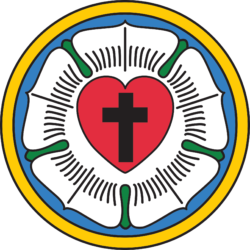One of the lay members of the council asked a question in response to reports related to our relationships with Lutherans in Ethiopia and Tanzania, as well as our commitment to the Global Confessional and Missional Lutheran Forum (hosted in conjunction with our Lutheran Week).
He asked, “Why is the NALC involved in international relationships?” He also asked that the answer to that question be shared with folks in the NALC to help them understand why we are focused on developing and encouraging relationships with other confessional and missional Lutherans around the world.
Addressing this in my Ministry Matters column seemed a direct and simple way to get the word out about the NALC and our international commitments.
To answer this question, we first look to the statement approved at the 2011 Convocation of the NALC. Presented and approved was An Initial Statement on the Ecumenical and Inter-Lutheran Commitment of the North American Lutheran Church. In it, we state:
Our confessional commitment leads us to participate in ecumenical and inter-Lutheran associations in response to Jesus’ prayer that all his believers may be one. We intend to engage in ecumenical and inter-Lutheran endeavors at the international, national, and local levels, in accordance with our commitment to the Scriptures and the Lutheran Confessions.
Our prayer is that the Holy Spirit will lead us into such ecumenical and inter-Lutheran endeavors in faithfulness to the Great Commission of our Lord to “go and make disciples of all nations, baptizing them in the name of the Father, and of the Son, and of the Holy Spirit, teaching them to observe all that I have commanded.” (Matt. 28:19) We believe that all ecumenical and inter-Lutheran relationships should have as their goal the mission of Christ and his church “that the world may believe. . .that the world may know.” (John 17: 21,23)
Echoing this initial statement guiding the international mission of the NALC, Bishop John Bradosky states, “The Great Commission calls us to be ‘world Christians.’ We are called by Christ to ‘go to all nations.’ Our concern is that the Gospel of Jesus Christ is proclaimed in every nation and that people are becoming disciples of Jesus Christ in every nation. The second reason that this is important is that these relationships are part of our witness to the world. We demonstrate that the love of Jesus Christ transcends every division of culture or language. It gives expression to the gift Christ gives to us in His Body, the unity that is expressed in our relationships with one another.”
The Rev. Dr. Jim Nestingen explains the new life and new expression that are ours in Christ Jesus, when he writes, “Easter destroys boundaries. So when He was raised from the dead, Jesus could say, ‘all authority in heaven and earth has been given to me’ and then send His disciples — and so the rest of us — to ‘make disciples of all nations.’ In fact, Paul tells us in Philippians that when Jesus has completed what He began with His death and resurrection, ‘every knee shall bow … and every tongue confess that Jesus Christ is Lord to the glory of God the Father.’”
Nestingen continues, “Sometimes human boundaries can’t be penetrated. But just like the risen Christ, God’s Word has a way of breaking through the limits. So the Church sends missionaries, people who will speak the Word, anywhere and everywhere. In Africa, in India, in Russia, in China, all over the world, God’s Word does exactly what He says: it kills and makes alive, creating faith in those who hear the Gospel.”
“One of the chief values of the North American Lutheran Church is its calling to be Congregationally Focused,” shares NALC Bishop Emeritus Paull Spring. “As such, our priority mission field is North America. At the same time, we are also members of a larger Christian community. We are not sectarians, cut off from the rest of the Church. In the Creed we confess that the Church is one and catholic (universal). The Apostle Paul teaches that the Church is one body with many members (Romans 12:5). In some places,” states Bishop Spring, “the Christian Church is weak and struggling; in other places the Church is strong and flourishing. Through our inter-Lutheran and ecumenical contacts, the NALC is able to support the Church where it is weak. We are also able to draw encouragement from those churches that are healthy and growing. ‘If one member suffers, all suffer together with it; if one member is honored, all rejoice together with it’ (1 Corinthians 12:26).”
“For example,” says NALC General Secretary Pastor Mark Chavez, “The Church in Africa and Asia is growing rapidly in the face of intense opposition, even persecution, from the other dominant religions in many countries. The Church grows in the midst of poverty and limited resources. It should be a wake-up call for us in comfortable North America. We need to be connected with the Church on those continents to support the members of Christ’s body, and to be inspired and motivated by their bold witness.”
Finally, the one person who is probably the most attuned to and involved with our international relationships, Assistant to the Bishop for Missions, the Rev. Dr. Gemechis Buba, offers four reasons for our global commitments and involvement:
- The NALC is looked at as a primary voice of reform and renewal in western culture today because we have taken a stand for the truth and authority of the Word of God, separated from Biblical and theological liberalism and established a growing denomination. The NALC is a great example and hope for others. The NALC shows that it is possible.
- Many African churches have disassociated themselves from liberal Lutheran denominations. That trend will continue. The NALC and our international relationships allow the African churches to maintain relationships, and they can relate to the NALC as a partner that is biblically and confessionally faithful and trustworthy.
- Churches in Europe look at the NALC and realize that, together, we can have the courage to stand up for the sake of Jesus Christ and our witness in the world. They can say, we won’t be alone! We have brothers and sisters in North America we can learn from and relate to. We won’t be in isolation.
- Ultimately, it is all about mission! The NALC is a church that learns and that shares with brothers and sisters around the world. Particularly, we have so much to give and to receive when it comes to best practices of mission. For the sake of mission, it is critical for us to relate. We already have missionaries around the world and will continue to be in mission together with all biblical, confessional and missional Lutherans!
As has been the case at our previous NALC Lutheran Weeks, our gathering in Nashville, Tenn., will have a decidedly international dimension. This is especially appropriate as we will be observing the 500th anniversary of the Reformation.
Aug. 7-11 will not only be the NALC’s annual gathering but also the opportunity for us to give thanks to God together for the good news that we are saved by God’s grace through faith in Jesus Christ!
We will not “celebrate” division, schism, or upheaval in the Body of Christ, but the fact that God is always at work, through His Word and Holy Spirit, reforming the Church. The Holy Spirit was at work in the 1500s through the life and ministry of Dr. Martin Luther, even as God is at work today, around the world, creating and strengthening faith in Jesus Christ — “the same yesterday and today and forever” (Hebrews 13:8).
The theme of our 2017 Lutheran Week will speak to that continuing renewal and reform, as we focus on Philippians 2:12-18:
Therefore, my beloved, as you have always obeyed, so now, not only as in my presence but much more in my absence, work out your own salvation with fear and trembling; for God is at work in you, both to will and to work for his good pleasure. Do all things without grumbling or questioning, that you may be blameless and innocent, children of God without blemish in the midst of a crooked and perverse generation, among whom you shine as lights in the world, holding fast the word of life, so that in the day of Christ I may be proud that I did not run in vain or labor in vain. Even if I am to be poured as a libation upon the sacrificial offering of your faith, I am glad and rejoice with you all. Likewise you also should be glad and rejoice with me.
The Global Confessional and Missional Lutheran Forum will be integrated more fully into the presentations, responses and discussion of our Mission Festival, with representatives from Sweden, Denmark, Norway, Germany, Belarus, Ethiopia, Tanzania, Sudan and other countries, all reflecting with us on “Congregational Renewal through the Word of God.”
In addition to the Global Forum, now in it’s third year, we will be blessed by the presence of the newly elected President of the Ethiopian Evangelical Church Mekane Yesus, the Rev. Yonas Yigezu, who will be the preacher at the Service of the Word at the beginning of our Mission Festival on Wednesday afternoon, Aug. 9. Also present will be the Rev. Dr. Berhanu Ofgaa, General Secretary of EECMY, who has been a participant in the Global Forum since its inception.
Our guest, and preacher at the Festival of the Reformation Service of Holy Communion, Thursday, Aug. 10, will be the Rt. Rev. Dr. Fredrick Onael Shoo, Presiding Bishop of the Evangelical Lutheran Church in Tanzania.
We will also be joined by three distinguished professors of the ELCT Tumaini University Makumira, which includes their School of Theology. Participating in our Lutheran Week will be The Rev. Prof. Dr. Joseph W. Parsalaw, Vice Chancellor; the Rev. Dr. Angela Olotu, Dean, Faculty of Theology; and the Rev. Dr. Faustin Mahali, Deputy Vice Chancellor for Administration.
Far from a Reformation celebration focused on a German monk, priest and theologian of the 16th century, the NALC’s Lutheran Week observance will acknowledge the global nature of the Gospel, the Great Commission, the Body of Christ, and the Lutheran tradition.
It will truly be a celebration of biblical, confessional and missional Lutheranism, as together we seek to hold fast to the Word of life, while praying that God will continue to renew, reform and transform His Church in the world. While the Lutheran Week is one relatively small part of the overall life and ministry of the NALC, it is reflective of our global, international commitment to making disciples of all nations, baptizing, teaching all that Jesus has commanded us.
I hope this answers the question, “Why is the NALC involved in international relationships” and perhaps stirs up a bit of heartfelt mission fervor in you as well! If this raises other questions, or you have other questions you would like me to address in this Ministry Matters series, please email me at [email protected].


